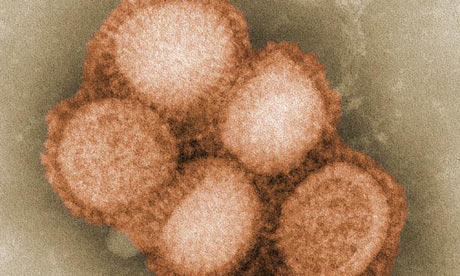
The government moved to reassure the public that its strategy for coping with the flu pandemic was robust after the website designed to ease pressure on overwhelmed GPs was blocked to visitors within minutes of its launch.
A Department of Health spokeswoman admitted during the shutdown that the website had been overwhelmed, but insisted: "The National Pandemic Flu Service website has not crashed. It is experiencing unprecedented demand with 2,600 hits per second, equivalent to 9.3m hits per hour. The technology for the call centres and the antiviral collection points has not been affected by this issue and is working normally."
Opposition politicians were quick to criticise the service's inauspicious start. Andrew Lansley, the shadow health secretary, said it was inadequate to cope with the rapid spread of the pandemic, which resulted in more than 100,000 new infections last week alone.
"There is still far too much confusion about access to diagnosis and treatment for swine flu," he said. "Already, the government's new flu line service is unable to cope with demand. The website informs visitors they're too busy to deal with their request, and reports that staff manning the service lack the medical expertise or training to offer a flexible response. It's clear that this interim service is simply too little, too late."
Norman Lamb, the Liberal Democrat health spokesman, said the website problem was "obviously very worrying and raises serious questions about the robustness of the pandemic flu system. The government claims the reason for the delay in setting up this service was because they needed to thoroughly test it to ensure this wouldn't happen."
The online element of the National Pandemic Flu Service could not cope with the amount of traffic it began receiving as soon as it launched. For its first few hours the website either failed to operate or let some users in while simultaneously telling others it was still out of action. BT, which is hosting the service, had to step in and quadruple the capacity in order to satisfy the huge interest in the new "symptom-checker".
The website and its accompanying helpline have been created so that people in England who fear they may have contracted the H1N1 virus can either self-diagnose the condition by going through an online questionnaire or by undertaking the same exercise by telephone with a call-centre handler. Callers identified as having swine flu by either method are being prescribed the antiviral drug Tamiflu, which a "flu friend" – a relative or friend – then collects on their behalf from a secure distribution point.
The service is a key part of the government's strategy to try to contain the pandemic until a vaccine is available, possibly as soon as next month. The department says that what it calls the flu "self-care service" will help take the pressure off GPs and hospital casualty units, many of which have experienced heavy demand from people who may be infected. However, at-risk groups, such as pregnant women and children under one year old, will continue to be assessed by their GP.
The telephone helpline seemed to be working normally. Initially 1,500 staff at 19 call centres across England will handle up to 200,000 calls a day and guide people through a computer program that is intended to detect, or rule out, swine flu.
But Professor Steve Field, chairman of the Royal College of General Practitioners said: "I expected a few teething problems. I'm not entirely surprised the website has crashed. It's likely that millions of people have been going on to it to have a look, just as they did when the National Archives went online. All that matters here is patient safety and that is not at risk because this is an additional service and GPs are still continuing to do their jobs."
The department also responded to concerns about people using the new service to fraudulently obtain Tamiflu. "We expect everyone to play by the rules and treat the system fairly. The system is designed so that it will only issue antivirals once to an individual," a spokeswoman said.
Callers are meant to have their identity checked. Those deemed to have the virus will be issued with a verification code and each flu friend will have to provide some form of identification for the patient before being given the Tamiflu, such as a passport, driving licence or NHS card.
But the department admitted the security of the new service would be improved. "When the full service comes in it will have a more flexible IT platform so it will be more robust and have more security measures in it, but users will see no difference," said the spokeswoman.
An emergency planning officer who managed to access the website before it went live at 3pm spotted what he identified as a series of weaknesses. "At no point did you have to tell the system who you were. They do not reconcile the information with your medical records. They simply ask you if you have had Tamiflu. So you could simply say no and be authorised to collect it."
The British Red Cross has offered to provide volunteers to act as a flu friend for someone who has nobody else to turn to, if the local health authority asks them to.

